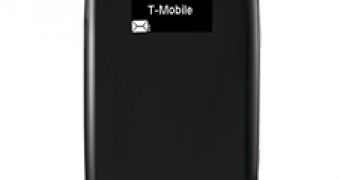Today, wireless operator T-Mobile is set to make available for purchase on its airwaves a new device that would enable users easily connect to its enhanced HSPA+ network, namely the T-Mobile 4G Mobile Hotspot.
The new device was officially unveiled several weeks ago, but T-Mobile confirmed its launch date and pricing only recently.
“The T-Mobile 4G Mobile Hotspot will be in stores April 13, 2011 for $79.99 after $50 mail in rebate and new two year agreement,” the wireless carrier notes in a recent blog post.
Moreover, the company confirmed that other 4G devices would become available on its airwaves later this spring, the T-Mobile Rocket 3.0 and prepaid T-Mobile Rocket 4G.
The new T-Mobile 4G Mobile Hotspot is manufactured by Chinese telecoms company ZTE, and comes with support for up to five devices.
The same as with any other similar device, the T-Mobile 4G Mobile Hotspot was designed to create a personal access point so that users would be able to connect to T-Mobile 4G Mobile Hotspot with devices that come only with WiFi capabilities.
The device would be made available on a $84.99 per month data plan, it seems. With it, users would benefit from 10GB of mobile broadband with no overages, but with throttled speeds when the 10GB soft cap is reached.
Here's what T-Mobile has to say on the new 4G Mobile Hotspot: “Manufactured by ZTE, the sleek, compact device weighs 2.64 ounces and fits in the palm of a hand.
The 21 mbps-capable hotspot features an OLED display to show signal strength, number of connected users, battery level and network connection type. It also includes an SD card slot for up to 32 GB of expandable memory.”
On top of that, the T-Mobile 4G Mobile Hotspot comes with a compact design, resembling a clamshell phone, and offers support for all kinds of Wi-Fi enabled devices, including music players, gaming consoles, tablets, laptops, cameras, eReaders, or other devices.
T-Mobile’s HSPA+ 4G network is already available in a wide range of markets around the United States, but does not offer full nationwide coverage as of yet. Read more on it here.

 14 DAY TRIAL //
14 DAY TRIAL //